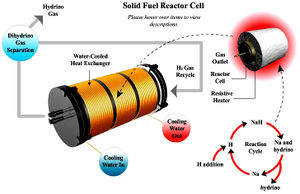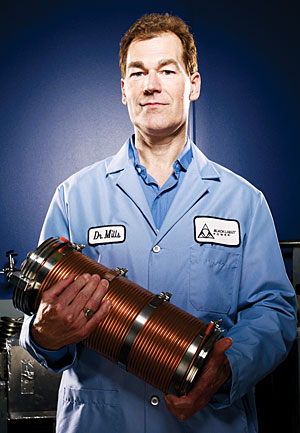Hydrino
Hydrino is an invention of the the U.S. American physician and electrical engineer Randell Mills (born 1957), a form of an hydrogen atom which is created when the energy of a hydrogen atom is lowered below its ground state. Physicists criticize the theory of hydrinos as pseudoscience[1][2][3][4] and reject it as "just silliness"[5]
A chemical reaction is claimed to move electrons to a lower orbit around the proton, which creates the alleged hydrino. As a consequence energy is set free. As a further consequence this new Hydrino atom (which has never been found in any experiment) would have to be more stable than the original hydrogen atom. This behavior would violate the violate the theory of quantum mechanics.[6] That fact is accepted by Mills but he believes that the theory quantum mechanics should be replaced by his grand unified theory of classical quantum mechanics(GUT-CQM), which is compatible with hydrions.[7] Mills' model is claimed to derive from the works of Hermann A. Haus in 1986.
According to supporters of the hydrino theory it would be useful in various areas like rocket engines. Alas, the NASA was not interested.
Commercial activities
The company "Blacklight Power"[8], located in Cranbury (New Jersey, USA) is a supplier for the hydrino technology. Blacklight Power was founded in 1991 by Mills under the name "HydroCatalysis Inc.".[5] The company is funded by investors and not through licensing or selling products. Blacklight Power has announced several times in the past that they are just months away from a breakthrough with their technology which led to the entry of new investors.[9] In 1997 Blacklight Power announced that they just need another six months to build a 100 kilowatt engine. Similar announcements were made in germany by the companies [Felix Würth AG]] and Perendev-Group. The company Perendev-Group of Mike Brady is not reachable anymore; Mike Brady was arrested March, 29. 2010 in his house in Wollerau (Swiss). Charges were pressed since advance payments for energy producing magnet generators were kept.[10] In Swiss, the company Raum-Quanten-Motoren AG (RQM) of Hans Lehner tried to winn investors with a similar plot. In Ireland the company Steorn is on the lookout for investors in their "Orbo"-Technology, which will "soon" be ready to create energy.
According to Mills and Blacklight Power hydrinos emit energy as ultraviolet light (so called blacklight) and there are 137 energy levels of the hydrogen atom below the ground state. Use of hydrogen should allow to produce a hundred to two-hundred times more energy through hydrino transition than chemical burning of hydrogen. A prototype of such a generator should produce 50 kilowatt heat capacity. A fraction of this energy should be enough to create hydrogen from water. This would - if the specifications of Blacklight Power were true - allow build a perpetual motion device. Perpetual motion devices violate the laws of thermodynamics and cannot be build.
Hydrex
The hydrino theory is very similar to the theories of the Frenchmen Jacques Dufour und Jacques Foos who claim that a "Hydrex" atom with similar properties exists and use the term in conjunction with cold fusion. The principles differ, the Hydrex atom is created with a strong electromagnetic field according to its inventors. Die Hydrino-Theorie ähnelt stark den Annahmen der Franzosen Jacques Dufour und Jacques Foos, die unter dem Namen Hydrex ebenfalls ein komprimiertes Wasserstoffatom verstehen und es mit einer hypothetischen kalten Fusion in Verbindung bringen. Allerdings sind die Vorschläge zur Erzeugung eines Hydrex-Atoms von denjenigen des Hydrino verschieden. Ein Hydrex bilde sich nämlich bei Anwesenheit eines intensiven elektromagnetischen Feldes.
Patents
- US Patent 6,024,935: Lower-Energy Hydrogen Methods and Structures. Date of Patent: Feb 15, 2000
Literature
- Alok Jha: Fuel's paradise? Power source that turns physics on its head, The Guardian, 4. November 2005
Weblinks
- http://www.heise.de/tp/r4/artikel/28/28971/1.html
- http://en.wikipedia.org/wiki/Blacklight_Power
- http://techskeptic.blogspot.com/2008/07/more-nonsense-in-energy-sector.html
- http://www.chem.info/ShowPR.aspx?PUBCODE=075&ACCT=0000100&ISSUE=0908&ORIGRELTYPE=TJI&RELTYPE=PR&PRODCODE=00000&PRODLETT=EA&CommonCount=0
- http://www.iop.org/EJ/article/1367-2630/7/1/127/njp5_1_127.html
- http://www.iop.org/EJ/abstract/0022-3727/41/10/108001/
Quellennachweise
- ↑ Loser: Hot or Not?, IEEE Spectrum 2009
- ↑ An overview of almost 20 years' research on cold fusion, Contemporary Physics, 2008
- ↑ Blacklight Power bolsters its impossible claims of a new renewable energy source, The New York Times, 2008
- ↑ "A critical analysis of the hydrino model", New Journal of Physics 2005
- ↑ 5.0 5.1 "Academics Question The Science Behind BlackLight Power, Inc.", Crimson Staff (May 17, 2000).
- ↑ BlackLight's physics-defying promise: Cheap power from water, CNN Money, 2008
- ↑ The Grand Unified Theory of Classical Physics by Randell Mills
- ↑ Website Blacklight Power
- ↑ "Researcher Claims Power Tech That Defies Quantum Theory"Dow Jones NewsWires (October 6, 1999)
- ↑ Hokuspokus-Betrüger festgenommen!, tz-online, 2010 (german)

